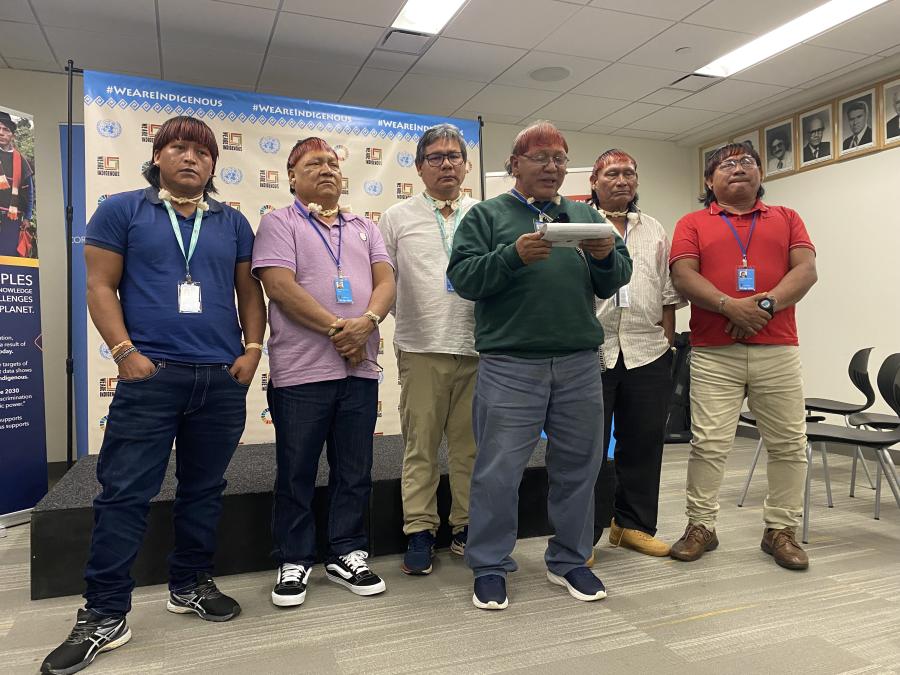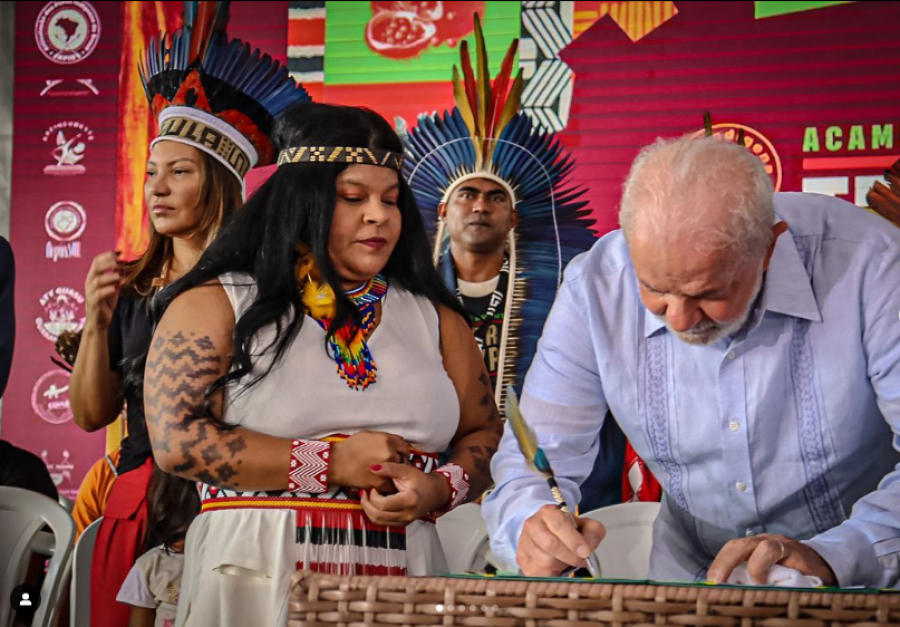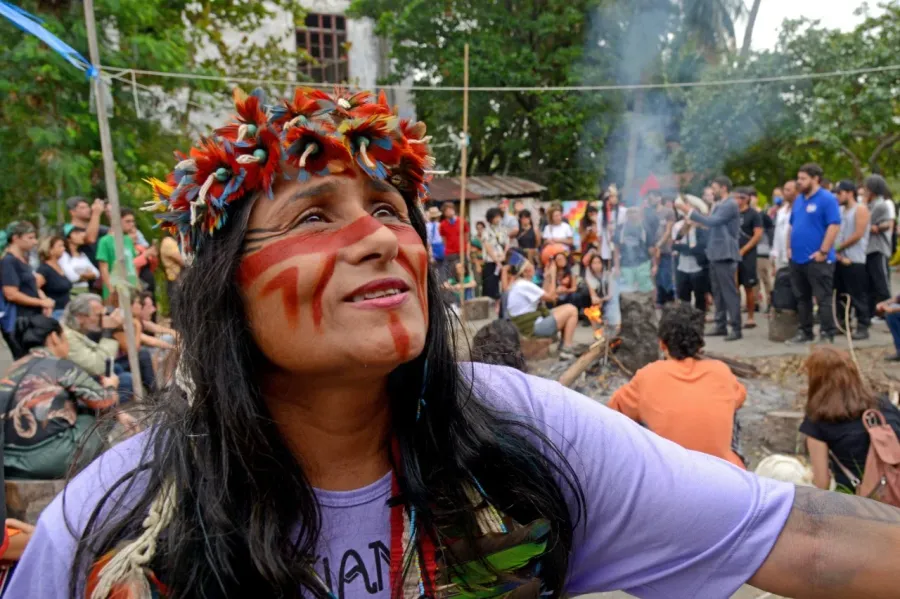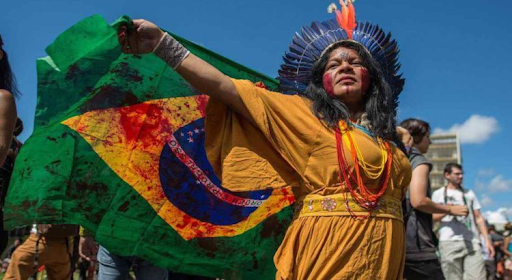
In 2022, a Brazilian Indigenous activist joined the list of TIME magazine’s 100 most influential people in the world when she received an award in the Pioneers category. Her name is Sonia Bone de Souza Silva Santos (Guajajara), also known as Sonia Guajajara. Guajajara was born March 6, 1974, in the Arariboia Indigenous land Maranhão in northeastern Brazil. She is the mother of three children: Yaponã, 22, Mahkai, 20, and Ywara, 16. On December 28, 2022, Guajajara made history when she was appointed by President Luiz Inácio "Lula" da Silva as the minister of the newly created Ministry of Indigenous Affairs.
Guajajara has a long history in the Brazilian Indigenous rights movement. Some of her awards and recognitions include the Order of Cultural Merit Award, awarded by the Ministry of Culture in 2015; the Honor of Merit medal from the government of Maranhão State in 2015; the João Canuto Award for the Human Rights of the Amazon and Freedom, awarded by the Human Rights Movement in 2019; and the Packard Award, awarded by the World Commission for Protected Areas of The International Union for Conservation of Nature in 2019.
Guajajara`s life path has not been an easy one. In 1984 at the age of 10, she left home and moved to the city to do domestic work to support her family. In 1989, supported by Indigenous organizations, she began her studies in literature and a nursing course.
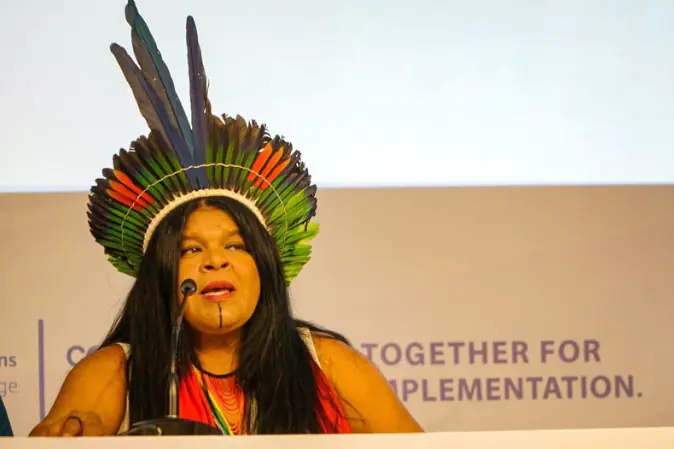
Photo courtesy of Sonia Guajajara's Instagram page.
In 2005, the Articulação dos Povos Indígenas do Brasil (APIB) was founded to advocate for the rights of Indigenous Peoples. APIB aims to bring together the various Indigenous organizations throughout the country, unify advocacy efforts of Indigenous Peoples and their agendas, and mobilize Indigenous communities from all regions of the country against threats and aggression.
In 2007, Guajajara began working with Indigenous organizations Coordenação das Organizações Indígenas da Amazônia Brasileira (COIAB) and Anmiga (Association of Amazonian Indigenous Women) in the Amazon region, and in 2009 she was elected Deputy Coordinator of COIAB. In 2013, she was elected Executive Coordinator of APIB. And In 2017, Guajajara launched her candidacy for the presidency of Brazil with an "Indigenous, anti-capitalist, and eco-socialist" agenda. She made such an impact that musical artist Alicia Keys ceded her space on the main stage of the global music event Rock in Rio for Guajajara to speak about the demarcation of land in the Amazon, during which Guajajara declared what has become the motto of her life: "Demarcacao Já – the mother of all fights!"
Guajajara is the first Indigenous woman to run for president of Brazil, and although she was not elected, she succeeded in gaining recognition and visibility for Indigenous Peoples’ issues. In 2021, she became the target of State harassment by then-president Bolsonaro and his supporters for her work to secure Indigenous Peoples’ rights (Read Cultural Survival’s Letter supporting Guajajara). In the country’s recent October 2022 elections, she was elected to congress with more than 150,000 votes as federal deputy for São Paulo, the most industrialized state in Brazil.
After decades of State guardianship and lack of effective participation in policies involving Indigenous Peoples, in 2022 Brazil created a Ministry of State for Indigenous Peoples. It is the first time in the history of Brazil that the country has created a Ministry specifically for Indigenous Peoples. This means that, for the first time, public institutions, State policies, and policies for Indigenous Peoples will be managed by Indigenous people. Guajajara has made history as Brazil's first-ever Minister for Indigenous Peoples. She called her appointment an “historic reparation” after years of struggle and after the catastrophic reign of Bolsonaro.
Ministers of State are appointed by the president to assist in various functions of the executive branch. As a minister, Sonia Guajajara will manage not only FUNAI, the State agency for Indigenous Peoples, but all secretariats, agencies, and public bodies responsible for public policies for Indigenous Peoples, including healthcare, education, and justice. She will also be responsible for informing the Brazilian State about the situation of Indigenous Peoples and assisting, creating, and implementing public policies based on the threshold for land, rights, and Indigenous livelihoods.
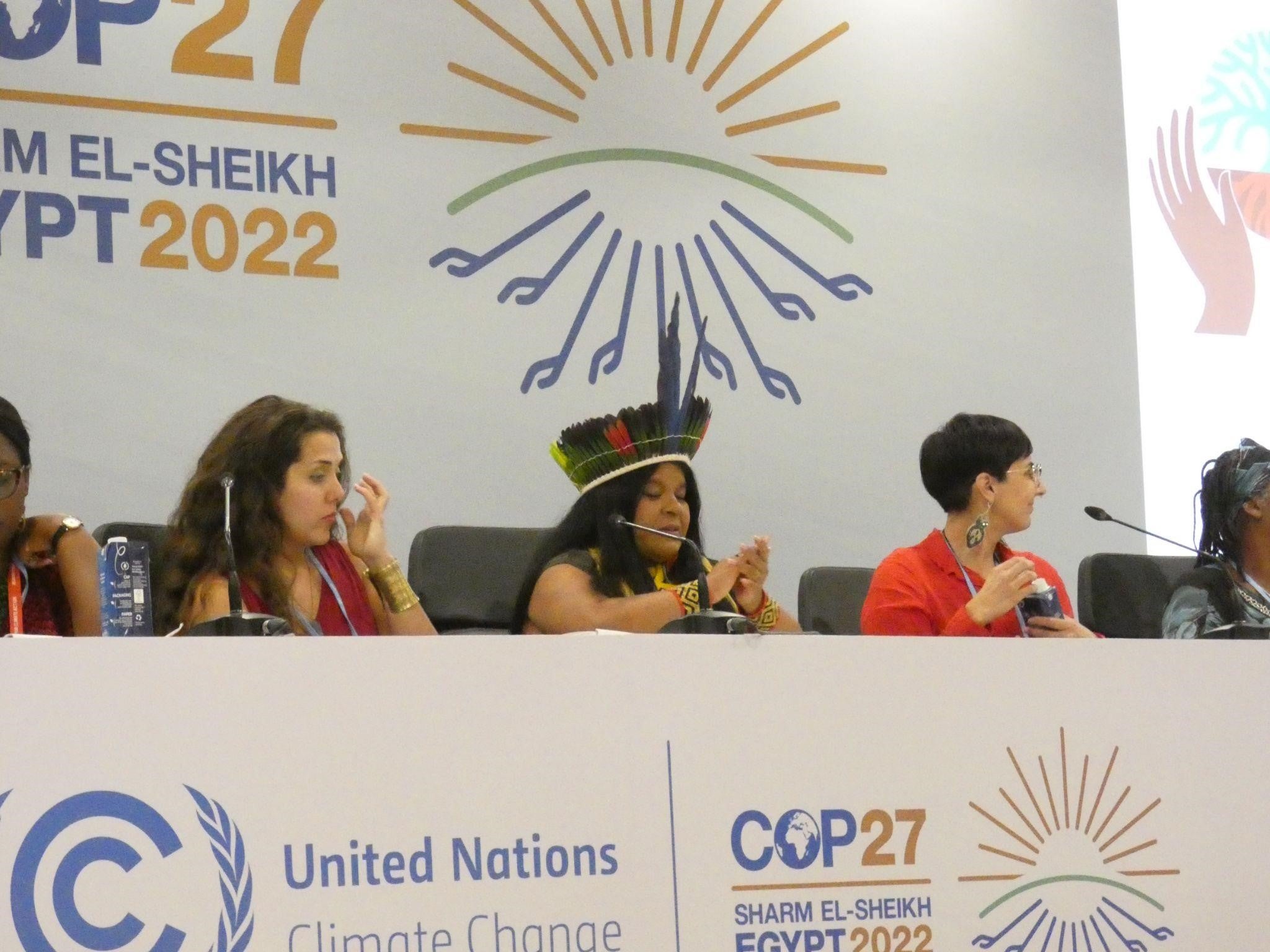
Sonia Guajajara at COP27. Photo by Edson Krenak.
Seven Challenges of the New Ministry
The Ministry of Indigenous Peoples will be led by communities in a culturally-guided, gender-balanced, accountable, and transparent manner while working within existing State structures. Here are seven of Guajajara's biggest challenges she will face as a minister:
1. Putting Indigenous Peoples in the budget permanently
Several sectors of Brazilian society, especially the economic and political ones, still see Indigenous Peoples as obstacles to development and push an agenda that profoundly impacts them, damaging their lands, impoverishing their territories, and annihilating public policies for Indigenous Peoples. Using the resources of the State will strengthen the Indigenous agenda by including “legal rules that bind the whole of society. It is necessary to see this space as strategic for the empowerment of our Peoples and to ensure that effectively our struggles and agendas are evidenced and transformed into instruments of resistance and power in this sharp context of correlation of forces and permanent attacks on Indigenous rights” (Source: APIB - Our Letter for Politics).
2. Demarcating and protecting the demarcated lands
According to the government transition report published in December 2022, the criminal omission by the State in the supervision of Indigenous lands affected Indigenous Peoples in all regions. In addition to freezing demarcations, the former Bolsonaro government made conditions more insecure for Indigenous Peoples. It is estimated that about 40 percent of the Indigenous population was affected by rights violations. FUNAI, which is charged with the protection of Indigenous lands (and in 2023 will be renamed the Indigenous Peoples National Foundation), was dismantled and suffered drastic budget cuts as well and poor management. In 2022 it spent just 30 percent of its budget.
Also during Bolsonaro’s rule, from 2019-2022, the number of Indigenous land defenders killed by deadly force rose to as many as 170 annually—a staggering failure on FUNAI’s part to protect Indigenous Peoples. Guajajara will have to work to repeal laws that have left Indigenous lands more vulnerable, a fight that she calls "the mother of all struggles."
3. Putting an end to the physical and social vulnerability of Indigenous Peoples
The healthcare system, food, and education programs for Indigenous Peoples are in ruins. They need assessment, new policies, and protection mechanisms to ensure and guarantee the safety and well being of Indigenous communities and must include Peoples living in voluntary isolation and recently contacted Peoples. Over the last few years, there has been an agenda to destroy State agencies that provide healthcare, nutrition, and education to the Indigenous population. Significant reform is needed in State agencies that work in these areas.
4. Strengthening Indigenous languages
During the UN International Decade of Indigenous Languages (2022-2032), Brazil has to do more to protect the 190 languages that are at great risk of disappearance. Public policies, education, literature, research, and spaces of power need to include Indigenous languages in their scope and work. As the main laws and the constitution of the country themselves, Indigenous language and culture policies need to focus on the relations between traditional society and scientific knowledge, orality and writing, traditions and translations, and the construction of intercultural education in education policies in the country as a whole. Actions must be aimed at financing and providing Indigenous communities with the recovery of their historical memories, the reaffirmation of their identity, the revitalization of their languages, and intergenerational knowledge transfer. For this, it is necessary to ensure access to information and technical and scientific knowledge. The efforts to reclaim, revitalize, maintain, and strengthen Indigenous languages must happen in so-called spaces of prestige, such as schools and universities, where knowledge is produced, shared, and fostered.
5. Reaching Indigenous people living in urban areas
Guajajara grew up in the city and knows that Indigenous people in the urban context suffer even more today from invisibility and the denial of rights. Creating a system of self-determination and recognition of the ancestry of those who no longer live on traditional territories is crucial to reverse the legal ethnocide colonialism has created.
6. Creating mechanisms to prevent, adapt to, and compensate for environmental disasters
As Guajajara has pointed out, she must work alongside the Ministry of the Environment and Climate Change to secure the rights of Indigenous Peoples as the main guardians of the environment. “Loss and damage” management has to be managed and led by Indigenous people, because of the cultural and spiritual impacts of such events. (Read: “High-level Statement of the Indigenous Peoples Caucus at COP 27”.)
7. Strengthening and fostering Indigenous economies and entrepreneurship
The historical relationship between Indigenous Peoples and the State factors mentioned above add to a colonist and extractive heritage and policy that transformed sovereign Indigenous communities into dependents of the State. Indigenous Peoples are resilient, creative, and a powerhouse for economic activity. Elsewhere in the world, such as in New Zealand, they have been leading the way in social and technological entrepreneurship; among those who lead this revolution are Indigenous business leaders. Investing in Indigenous economies, international relationships, and partnerships at the global level can increase Indigenous entrepreneurship in Brazil.
Top photo: Photo courtesy of Sonia Guajajara's Instagram page.
